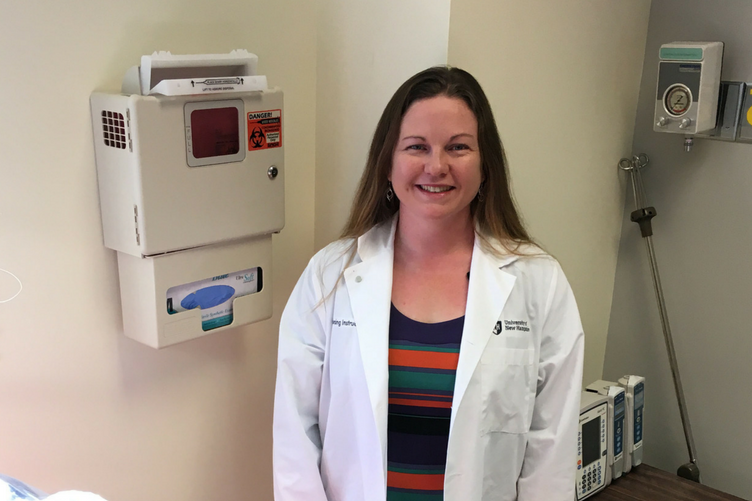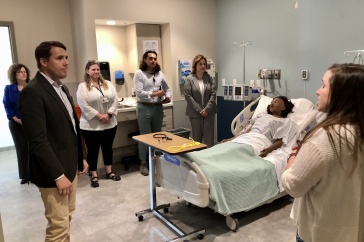
Kerry Nolte is advocating for New Hampshire's vulnerable populations.
New Hampshire continues to rank second highest for the number of opioid-related deaths relative to its population, causing a wide range of health challenges for users and the community alike. Kerry Nolte '09G, assistant professor of nursing, understands firsthand how the opioid crisis affects families.
A member of the New Hampshire Harm Reduction Coalition (NHHRC), she advocated for New Hampshire SB 234 to allow syringe service programs (SSPs) in the state. SSPs engage people who use drugs through education, safer supplies and overdose prevention to reduce health risks. SB 234 also decriminalized trace amounts of drugs found in syringes so that users would be less motivated to discard needles in public places. Nolte played an active role in supporting the legislation, which does not have funding attached to it and relies on grassroots efforts to carry out prevention and education.
Nolte and other volunteers of NHHRC focus on education and treatment from a patient-centered perspective. NHHRC is a statewide grassroots organization dedicated to the implementation of public health strategies that reduce the harm associated with drug use and misuse. The group engages in policy advocacy, multi-sector education, resource and policy development, coalition and capacity building and direct services.
“We operate a program called HAND-UP in the Seacoast area that is very outreach-focused,” Nolte says. “Volunteers are on the streets and connect and follow up with people who use drugs. They provide education, clean supplies and connections to healthcare. The goal is to engage with people where they are at and support their health needs.”
“It’s about accepting people where they’re at and getting them to connect on health. The tragic precedent is that people who use drugs are often treated so poorly, so just showing that you care about their health is a huge intervention."
Aside from providing sterile syringes/needles, the group counsels drug users on overdose prevention, wound care, STD prevention, testing for infectious diseases like HIV and hepatitis and referrals to treatment.
Recently, Nolte and others in the coalition published a resource called “Have the Conversation: Caring for People Who Inject Drugs” to help healthcare providers engage with clients on reducing drug and injection-related harms. The publication, which is shared with healthcare providers across the state, has been endorsed by the New Hampshire Governor’s Commission on Alcohol and Drug Abuse Prevention, Treatment and Recovery.
It was while working toward her bachelor’s degree in nursing at Northeastern University that Nolte first encountered patients with substance use disorders through her work as an EMT. She then went on to earn her master’s degree in nursing at UNH. She worked at Catholic Medical Center in the intensive care unit and later as a family nurse practitioner at Families First in Portsmouth, a federally qualified community health center, where she still practices per diem.
“As a nurse practitioner at Families First, I had to consider the social factors and social determinants of their health — thinking about how cost and transportation and meeting their basic needs factored into their care,” she says.
Nolte said providing compassionate care to patients who use drugs and engaging them in treatment when appropriate has always been a part of her nursing practice. Her research focus in her doctoral program at Northeastern looked at HIV prevention.
At UNH, Nolte teaches the undergraduate introduction to nursing and graduate courses in health policy and finance, primary care of families and advance health assessment and diagnostic reasoning. Central to her teaching is looking at how to spark patient behavioral change and engaging patient motivation.
“It’s about accepting people where they’re at and getting them to connect on health. The tragic precedent is that people who use drugs are often treated so poorly, so just showing that you care about their health is a huge intervention. It means a lot and is something different than what they’ve experienced,” Nolte says.
In her most recent research, Nolte continues to explore caring for people who use drugs, and her focus is on how positive healthcare experiences can motivate people to adopt healthier habits. She plans to collect data on healthcare experiences from people who use drugs through interviews. For example, statistics show that people who have an infection from injecting drugs face longer periods of hospitalization and have a high likelihood of leaving the hospital before their wounds are treated. This often means they need to return for treatment of more complex infections. Looking at the harm reduction protocols healthcare providers use with patients and how patients respond might open the door to helping more patients seek and complete treatment.
“I’m interested in the positive experiences those people had and how they were engaged in care and accepted,” Nolte says. “The idea that you see a patient, prescribe a drug and they adhere to your plan does not engage people in their care and does not work. It has to be collaboration between provider and patient. Collaborating on a care plan is critical to their follow-through on interventions.”
-
Written By:
Krysten Godfrey Maddocks '96 | College of Liberal Arts | krysten.godfreymaddocks@unh.edu



















































